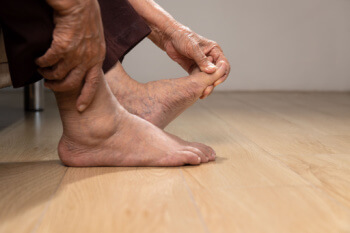Connect With Us
Blog
Gout Management Techniques
 Gout is a form of arthritis characterized by sudden, severe attacks of pain, swelling, and redness in the joints. These symptoms often occur in the big toe. Treatment focuses on relieving pain during attacks and preventing future episodes. A podiatrist, or foot doctor, may recommend medications like nonsteroidal anti-inflammatory drugs, colchicine, or corticosteroids to reduce inflammation and pain during acute flare-ups. To manage gout long-term, changes in diet and lifestyle, such as reducing intake of high-purine foods, like red meat and seafood, increasing hydration, and maintaining a healthy weight, are important. A podiatrist can also suggest footwear designed to alleviate pressure on the affected joints, which may involve the use of orthotic devices for extra cushioning and support. Longer-term management techniques may involve the prescription of urate-lowering medications to decrease levels of uric acid in the blood. This helps to prevent the formation of urate crystals that cause gout symptoms. Regular follow-ups with a podiatrist are important to monitor gout symptoms and adjust treatment plans as needed. If you have gout, it is suggested that you consult with a podiatrist for targeted treatment.
Gout is a form of arthritis characterized by sudden, severe attacks of pain, swelling, and redness in the joints. These symptoms often occur in the big toe. Treatment focuses on relieving pain during attacks and preventing future episodes. A podiatrist, or foot doctor, may recommend medications like nonsteroidal anti-inflammatory drugs, colchicine, or corticosteroids to reduce inflammation and pain during acute flare-ups. To manage gout long-term, changes in diet and lifestyle, such as reducing intake of high-purine foods, like red meat and seafood, increasing hydration, and maintaining a healthy weight, are important. A podiatrist can also suggest footwear designed to alleviate pressure on the affected joints, which may involve the use of orthotic devices for extra cushioning and support. Longer-term management techniques may involve the prescription of urate-lowering medications to decrease levels of uric acid in the blood. This helps to prevent the formation of urate crystals that cause gout symptoms. Regular follow-ups with a podiatrist are important to monitor gout symptoms and adjust treatment plans as needed. If you have gout, it is suggested that you consult with a podiatrist for targeted treatment.
Gout is a foot condition that requires certain treatment and care. If you are seeking treatment, contact one of our podiatrists from Greater Boston Foot Care, PLLC. Our doctors will treat your foot and ankle needs.
What Is Gout?
Gout is a type of arthritis caused by a buildup of uric acid in the bloodstream. It often develops in the foot, especially the big toe area, although it can manifest in other parts of the body as well. Gout can make walking and standing very painful and is especially common in diabetics and the obese.
People typically get gout because of a poor diet. Genetic predisposition is also a factor. The children of parents who have had gout frequently have a chance of developing it themselves.
Gout can easily be identified by redness and inflammation of the big toe and the surrounding areas of the foot. Other symptoms include extreme fatigue, joint pain, and running high fevers. Sometimes corticosteroid drugs can be prescribed to treat gout, but the best way to combat this disease is to get more exercise and eat a better diet.
If you have any questions please feel free to contact our office located in Plymouth, MA . We offer the newest diagnostic and treatment technologies for all your foot and ankle needs.
